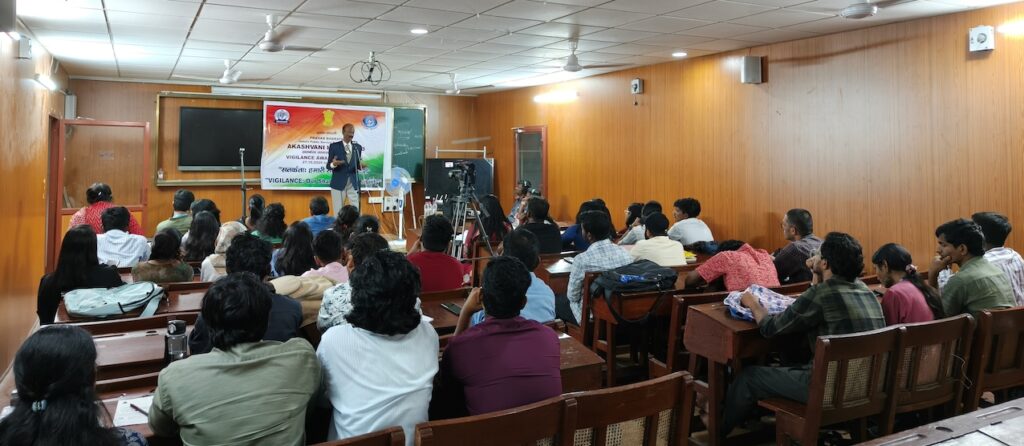By Bhuvana Kruthi (Semester I)
The Department of Journalism and Mass Communication, Osmania University, in collaboration with Akashvani, Hyderabad, organised a Special Lecture to mark Vigilance Awareness Week – 2025 on the 27th October. The programme, originally scheduled for 10:30 a.m., commenced at 12 noon and concluded at 1:00 p.m.
The session began with a warm welcome and introduction by Mr. Rana Pratap, an alumnus of the department and a radio broadcaster at Akashvani, Hyderabad. He introduced the distinguished guest speaker, Sri M.V. Krishna Rao, IPS (Retd.), Former Director General of Sashastra Seema Bal (SSB), and briefly highlighted his exceptional service record and achievements.

Before commencing the lecture, Mr. Krishna Rao initiated a friendly and humorous interaction with Mr. Rana Pratap, asking him how he prepares and presents the script for a Sid Sriram song on air. This light conversation set the tone for the rest of the session.
Delivering his lecture on “Vigilance Awareness – Shared Responsibility,” Mr. Krishna Rao emphasized that vigilance is not confined to official observances or government programs—it is a shared moral and civic responsibility. He remarked that people often fail to think about vigilance because they focus solely on personal interests rather than the welfare of others.
He explained that corruption is one of the primary factors that weaken society and linked it historically to India’s colonial past. Referring to the Battle of Plassey (1757), he discussed how Mir Jafar’s betrayal and Omi Chand’s actions enabled British domination in India, demonstrating how individual greed can lead to collective downfall.
To connect the concept with modern issues, he referred to a recent bus accident in Kurnool, citing irregularities in the vehicle’s registration, ownership, and licensing. He highlighted that such incidents are not mere accidents but outcomes of corruption and negligence in public systems.
The lecture was followed by an interactive session where students actively engaged with the speaker. Despite his seniority, Mr. Krishna Rao’s humour, enthusiasm, and energy kept the audience engaged.
Towards the end, three second-year students presented reflections on the lecture in different languages: Sushma in Telugu, Yadhu in English, and Shama Shams in Hindi.
Before the formal conclusion, Ms. Niharika from AIR extended her heartfelt thanks to Mr. Krishna Rao for his insightful and inspiring session. She said All India Radio was in its 90th year and that they were trying to tailor their programming to bring the average age of listenership to 20s and 30s. She also announced the upcoming RJ auditions at Akashvani, encouraging students to participate and explore opportunities in radio broadcasting.
The session concluded with a Vote of Thanks delivered by Bhoomi Sri, expressing gratitude to the guest speaker, faculty members, and students for their participation and cooperation.
Students probe corruption from different angles
By Madiha Nahid
Students raised various queries about corruption and lack of vigilance in today’s world . Nandakshi from Sem. III asked: “What can a person do if she / he is forced to pay a bribe?”. In response Mr. Krishna Rao said bribe givers are compelled to give and that being responsible individually is what matters. Putting it bluntly, he said, “Go ahead and pay the bribe if you are really desperate for something, but don’t expect bribe when you are in a position of authority.”
Next, Venu, a first-year student asked: “As the renowned philosopher Chanakya mentioned that corruption is a lubricant and it is inevitable, how does the younger generation deal with corruption?” Responding to the query, Mr Rao stated: “The key to eliminating corruption completely is having a strong leader. But you have to be a hero or heroine to yourself — generally, honest officers are not touched. It’s all down to individuals.”
Another student asked about the threat from politics and crime joining hands. Mr. Rao remarked that despite taking money people still do not vote for the party giving the money. “In Munugodu, a lady was seen on video saying that ‘car’ had given her 10k and the ‘lotus’ just 6k. Unfortunately that’s how things are in some states. Richest states in terms of buying votes are AP and Telangana. Whereas in Bihar, it’s caste allegiance,” he said.
As the session came to an end, a student asked Mr. Rao to suggest a few steps that citizens can take to report any form of corruption they observe. Mr Rao explained that there is an anti – corruption bureau (ACB) in every state, and there is Lokpal at the very top. His advice was to file a complaint with the bureau if there is anyone observes corrupt practices.
Quote / Unquote
Central government employees are subjected to speeches on vigilance and anti-corruption every year. This year, the topic is good – ‘our shared responsibility’. Still, the fact is this is a ritual!
You have to be a hero or heroine to yourself — It’s all down to individuals.